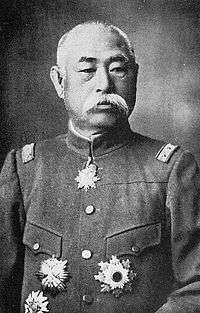Tsuchiya Mitsuharu
Baron Tsuchiya Mitsuharu (土屋光春, 23 September 1848 – 17 November 1920) was a general in the early Imperial Japanese Army.[1]
Tsuchiya Mitsuharu | |
|---|---|
 General Tsuchiya Mitsuharu | |
| Native name | 土屋光春 |
| Born | 23 September 1848 Okazaki, Aichi, Japan |
| Died | 17 November 1920 (aged 72) |
| Allegiance | |
| Service/ | |
| Years of service | 1870 - 1915 |
| Rank | |
| Commands held | IJA 11th Division, IJA 14th Division, IJA 4th Division |
| Battles/wars | |
Biography
Tsuchiya was born as the fourth son to a samurai family named Watari of the Okazaki Domain (present day Aichi prefecture), and was adopted into the Tsuchiya family as a child. He was sent by the domain to the predecessor of the Imperial Japanese Army Academy when it was still located in Osaka and was commissioned as a second lieutenant in the fledgling Imperial Japanese Army in 1870. He participated in the suppression of the Saga Rebellion and the Satsuma Rebellion.[1]
During the First Sino-Japanese War, Tsuchiya served on the staff of the Imperial General Headquarters. After the war, he commanded the IJA 27th Infantry Brigade, the IJA 1st Taiwan Reserve Combined Brigade and the 1st Guards Brigade. In 1902, he was promoted to lieutenant general.[1]
After the start of the Russo-Japanese War, Tsuchiya was given command of the IJA 11th Infantry Division under General Nogi Maresuke’s Japanese Third Army at the Siege of Port Arthur. His forces took heavy casualties, and Tsuchiya himself was wounded by a gunshot to the head while leading his troops in combat. After a period back in Japan to recover, he returned to Manchuria as commander of the newly formed IJA 14th Infantry Division.[1] In September 1907, Tsuchiya was ennobled with the title of baron (danshaku) under the kazoku peerage system.[2] In December 1908, Tsuchiya became commander of the IJA 4th Infantry Division. On 28 August 1910, he was promoted to general, and entered the reserves on the same day. He retired on 1 April 1915, and died after illness in November 1920. He was posthumously promoted to the honorific title of Junior Second Court Rank[3].
His son, Tsuchiya Mitsukane was a vice admiral in the Imperial Japanese Navy during the First Sino-Japanese War and Russo-Japanese War, and was subsequently a member of the House of Peers (Japan).
Decorations
- 1893 –
_3Class_BAR.svg.png)
- 1895 –

- 1895 –

- 1902 -
_2Class_BAR.svg.png)
- 1906 –

- 1906 –

Foreign
- 1896 –

References
| Wikimedia Commons has media related to Tsuchiya Mitsuharu. |
- Kowner, Rotem (2006). Historical Dictionary of the Russo-Japanese War. The Scarecrow Press. ISBN 0-8108-4927-5.
- Jukes, Geoffry (2002). The Russo-Japanese War 1904-1905. Osprey Essential Histories. ISBN 978-1-84176-446-7.
- Fukagawa, Hideki (1981). (陸海軍将官人事総覧 (陸軍篇)) Army and Navy General Personnel Directory (Army). Tokyo: Fuyo Shobo. ISBN 4829500026.
- Dupuy, Trevor N. (1992). Encyclopedia of Military Biography. I B Tauris & Co Ltd. ISBN 1-85043-569-3.
- Hata, Ikuhiko (2005). (日本陸海軍総合事典) Japanese Army and Navy General Encyclopedia. Tokyo: St. Martin's Press. ISBN 4130301357.
Footnotes
- Kowner, Historical Dictionary of the Russo-Japanese War, p. 390.
- 『官報』第7272号「授爵敍任及辞令」September 13, 1907
- 『官報』第2491号「叙任及辞令」November 19, 1920
- 『官報』第3127号「叙任及辞令」November 30, 1893
- 『官報』第3698号「叙任及辞令」October 19, 1895
- 『官報』第3698号「叙任及辞令」October 19, 1895
- 『官報』第5824号「叙任及辞令」December 1, 1902
- 『官報』号外「叙任及辞令」December 30, 1906
- 『官報』号外「叙任及辞令」December 30, 1906
- 『官報』』第4005号「叙任及辞令」November 2, 1896